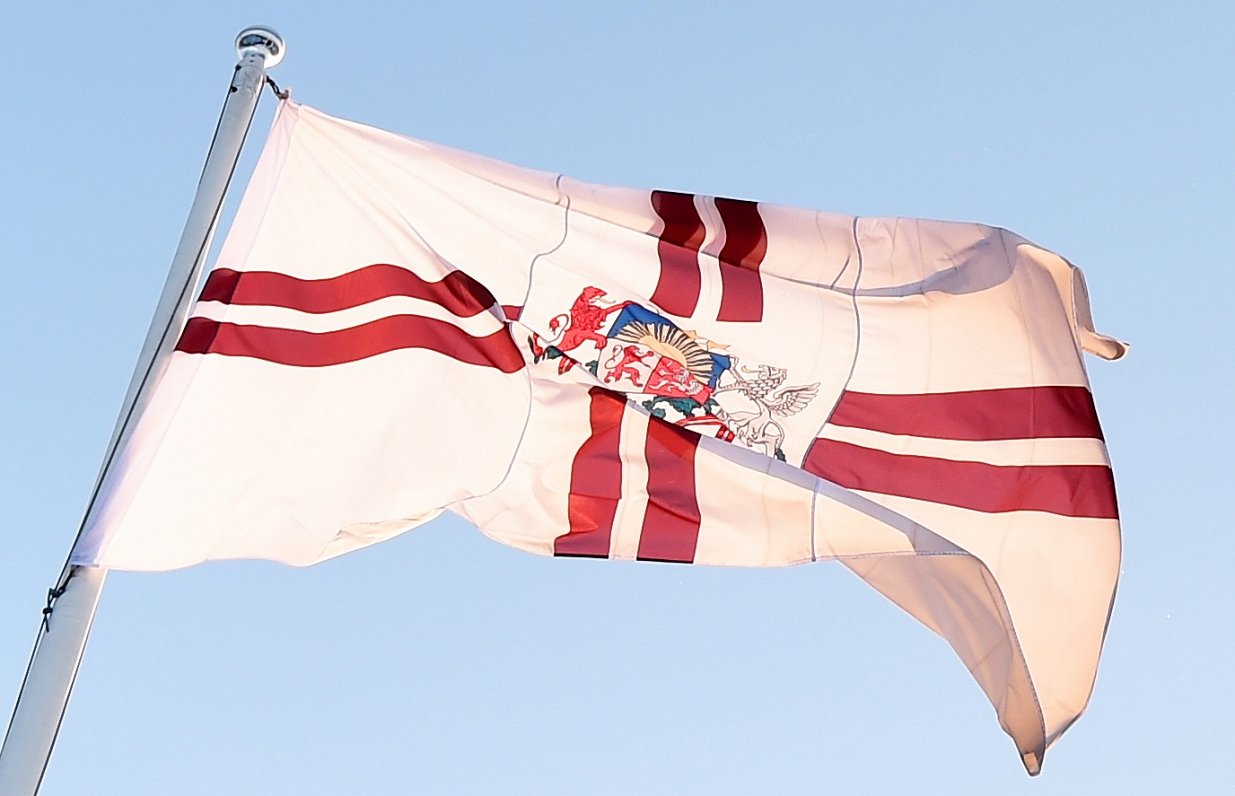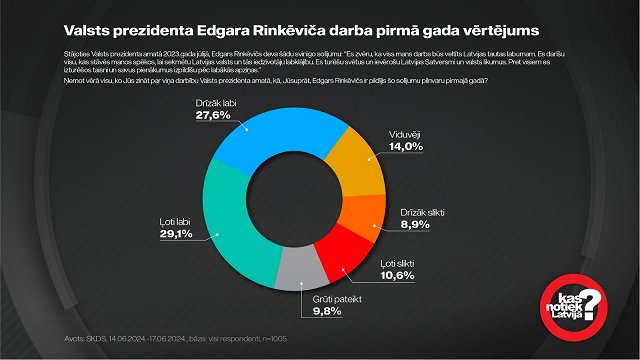The coalition parties will start a discussion on Monday, February 18 on their choice or choices as candidates for the post, reports Latvian Radio.
The weekly Coalition Cooperation Council will discuss what principles they will apply to select candidates and perhaps even the names of those they would like to see contest the vote in Saeima, which for the first time will be an open vote and not an anonymous ballot.
In principle the coalition would like to select a single candidate, who would then have little to prevent her or him becoming president, provided Saeima deputies vote along party lines. But having just one credible candidate backed by government might look more like a coronation than an election and the interests of democracy would arguably be better served by having genuine competition for the position of President.
So far, the name of only one candidate has been widely spoken - it is the judge of the European Court of Justice Egils Levits, whose profile has been notably raised in recent days despite the fact that he says he has yet to decide on whether to run.
Similarly the incumbent President Raimonds Vējonis - who beat Levits in the secret ballot four years ago - has yet to state whether he will seek a second term (two terms being the maximum permitted by the Constitition), though it is generally assumed that he will not.
Since then the rules have been changed so that this year's will be Latvia's first open presidential vote.
The exact date of the presidential vote has yet to be fixed, but just a few days after the European Parliament elections on 25 May, political forces will start preparing for the new Presidential elections. The head of the Saeima Legal Office Dina Meistere told Latvian Radio the date of the election of the President is determined by the Presidium of the Saeima.
"The date of convening a Saeima sitting at which the President is elected may not be earlier than 40 days, nor later than 30 days before the end of the current term of the President of Latvia," said Meistere.
"This means that the Saeima Presidium must be convened by the Saeima to elect the President no earlier than 29 May and no later than 7 June."
That in turn means that nominations to the post of President will have to be submitted to the Saeima Presidium between May 19 and 23.
A simple majority of 51 votes from the 100-member Saeima is all that is required to secure the top job in the land. Voting begins with all declared candidates in the running, but if no candidate receives 51 votes, the candidate with the fewest votes is removed from contention and another round of voting is held. This can happen several times until just two candidates are left. But even this does not guarantee a result. Saeima deputies can abstain or not vote (in the Saeima system, these are two separate categories). If no candidate receives 51 votes, fresh elections with fresh candidates will be organized.
Coalition support
Some parties have already expressed an opinion on who they think should be Latvia's next President.
Ainars Latkovskis, head of the Saeima faction of New Unity, suggests the smallest party in Saeima is unlikely to put forward its own candidate for the presidency, despite talk - not for the first time - that MEP Sandra Kalniete would be a popular candidate. New Unity already has the Prime Minister's chair and for a party with just 8 MPs to have both the Presidency and the Prime Ministership under its control would be strange indeed, and could cause disgruntlement among the coalition.
"It is important that the coalition partners put these candidates to the coalition for discussion. Whether it will be this Monday, I don't know, but it is correct to talk about the matter in good time," said Latkovskis. "We live in a free country, everyone can express their opinion... I hope that this time around we will manage it without a great deal of horse-trading and choose a candidate who is also a respected person within Latvian society."
The National Alliance has given its backing again to European Court of Justice Judge Egils Levits, just as it did four years ago. Levits has also won the backing of the New Conservative Party, meaning that in theory he already has a cadre of 29 supporters in Saeima.
The New Conservative Party's Juta Strike said: "We believe that Mr Levits would be a very respectable and good president. In principle we are ready to support him. We very much hope that other factions will support Mr Levits as presidential candidate and as President.”
The always unpredictable KPV LV party has yet to decide or declare its position on the presidency. Atis Zakatistovs, head of the party's Saeima faction, said: "The correct sequence of things, in my opinion, is - first, the criteria, then the candidates; and the question is how important it is for the coalition to agree on one joint candidate."
Similarly the final party within the five-party ruling coalition, Development/For! has yet to give its backing to a candidate but has not ruled out the possibility of throwing its weight behind Levits' candidacy too. Its 13 votes would bring the total up to 42.
"We are seriously considering this. We are the only liberal party in the Saeima. Who could stand for us, as, let's say, a candidate who symbolizes liberal values? I don't see anyone else that could do that," says party leader Daniels Pavļuts.
According to the National Alliance's Raivis Dzintars, it is in this potential for cross-party appeal that Levits' has his chance of securing the presidency.
"I allow that Development/Par! could want a less conservative candidate. At the same time, it seems to me that Egils Levits is not a hardliner,” says Dzintars, suggesting he has the ability to unite liberal and conservative parties.
Unofficially, there is talk of political trading between parties. For example, support for a presidential candidate in exchange for support for the post of European Commissioner.
"Officially, no one has expressed such a view, but we can feel in the wind that someone might want to link these issues," said Amber. "The National Alliance would not want it. It is necessary to discuss who would be the best candidate to be President of the country and on what principles a European Commissioner should be chosen. We have offered one suggestion. For example, the party that will gain the greatest support in European Parliament elections, from the spectrum of nationally-inclined parties, will be able to select its Eurocommission candidate."
Opposition support
Armands Krauze, leader of the Greens and Farmers Union (formerly the party of Vējonis - by tradition, people assuming the presidency sever any existing party links), is doubtful about whether the change from a secret to an open ballot will really result in greater transparency.
"I'm not sure that the current government makers will not go somewhere - maybe not to the zoo, but to the botanical gardens - and still don't agree on a candidacy," said Krauze, in reference to an infamous informal meeting of political fixers years ago at the zoo which supposedly decided on installing Valdis Zatlers as president.
"We will not know where this President has been chosen, but we will see who will vote. It will not be a conscience vote, it will be a matter of political discipline, especially on the part of the government-forming parties," says Krauze.
As for the largest party in Saeima, and the one perpetually condemned to opposition, Harmony, there will be a candidate named, even if he or she would seem to have little chance of success says faction leader Janis Urbanovičs. However, it will not be Baptist preacher Peteris Sproģis who was announced as the party's pick for president in its Saeima election campaign last year, only to withdraw soon afterwards due to the negative reaction he received.
"We will put forward a candidate because we are the biggest political force in Latvia," said Urbanovičs, though the Sproģis affair clearly still wrankles: "We have a lot to discuss and are now sending letters and offer to people. They are mostly not members of our party, who could be president for all of the people. If we agree [on a candidate] then we will warn them - be aware that you'll have the same problem as us - for the rest of your life, elected or not, you will have a black mark against your name. It is almost a priori a crime - to get support from Harmony.”
The last working day of President Raimonds Vējonis is July 7. Officially, his mandate will end at midnight. Precisely who will be sitting in Rīga Castle on July 8 remains to be seen, but if you are thinking of being a candidate and would like to try it out for size, you can take a virtual tour.
You can read more about the presidential election process, the history of the Latvian presidency and about previous presidents at the official presidential website (though note the information about the change from a secret to an open Saeima vote has yet to be updated).




























